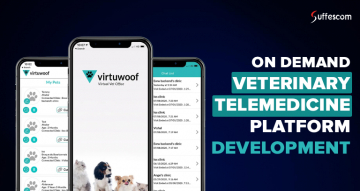Build Your Own Decentralized Web3 Chat App – White Label Messaging Solutions

In today’s hyper-connected world, billions rely on messaging apps like WhatsApp, Signal, and Telegram. But most of these platforms are centralized—exposing users to data tracking, third-party surveillance, and potential breaches.
Enter Web3 chat apps: decentralized messaging platforms powered by blockchain, where users have full control over their data, identity, and conversations.
If you're looking to launch a secure messaging platform with white-label capabilities, now is the ideal time to build a Web3 chat app that protects privacy and scales globally.
Did You Know? Over 70% of privacy-conscious users are switching to encrypted, decentralized platforms for daily communication.
Reliable Web3 Messaging App Development Services
At Suffescom solutions, we are dedicated to provide you decentralized options for social media apps. Create web3.0 messaging app for your IOS and Android platforms
What is a Decentralized Chat App?
A decentralized messaging app operates on a peer-to-peer architecture without centralized servers. Messages are transmitted directly between users and encrypted using public-private key cryptography, ensuring no third party can intercept or access the content.
Instead of using email or mobile numbers, users authenticate via crypto wallets—making the experience trustless and truly Web3-native.
Talk to our mobile app development experts to develop such an app with all essential features.
Key Features of Our Web3 Chat App Development
We build robust, Ethereum-based chat platforms tailored to your brand and business model. Here’s what you get:
Wallet-Based User Login
Instead of using emails or phone numbers, users sign in using crypto wallets like MetaMask or WalletConnect. This adds a layer of security and eliminates the need for passwords or third-party authentication.
End-to-End Encrypted Messaging
Messages are protected using public and private key encryption. Only the sender and recipient can read the content, making data leaks or surveillance practically impossible.
Typing Indicators & Live Status
Real-time indicators like “User is typing…” and online/offline status help make conversations feel fluid and responsive just like modern messaging apps.
Unique Public and Private Key
A decentralized chatting app is often protected via unique public and private key pair. With this, the messages can be protected from unwanted views. This feature is incorporated in many decentralized apps till now.
Group chat
Users can create private or public groups to communicate with multiple participants. Group limits and access rules can be customized depending on your use case.
Integration with Tor Network
Integrating your messaging app with the Tor network adds a security level, bypasses restrictive firewalls, and enables the creation of accounts on XMPP servers.
Voice calls
Another basic feature of a decentralized message app is voice calling. Users can securely share voice messages among themselves.
These are not the only decentralized chat features, you can make your app as complex as you want with the desired features that you want to incorporate. If you need some advice for your project, your can contact us anytime.
Need Custom Features? We tailor functionalities based on your use case—DAO communication, Web3 social platforms, enterprise messaging, and more.
How to Build a Decentralized Chat App?
We follow a structured approach to ensure scalable and secure dApp development:
Step 1- Blockchain Server Setup
In order to set up a server, create a free account with an email and password. The next is to confirm your account by going into your mailbox and clicking on the confirmation link. Further, when entering into your account, create a new server and select your preferred network type. Now, a pop-up window appears where you need to add the server name, region, network, and chain.
Once your server is set up, access its details, and copy your App ID and server URL for future use.
Step 2- Mobile Boilerplate Quick Start
Now that your server is ready, it’s time for a mobile boilerplate quick start. Begin by cloning or splitting the Ethereum mobile boilerplate. Click the copy icon adjacent to GitHub URL, open the code editor, open a new terminal, and paste the copied URL into the command line. Further, you can apply tweaks to the boilerplate code.
The ethereum dApp development process includes project ideation, building smart contracts, setting up the front-end designs, and creating a robust centralized back-end. On a note, using Ethereum Mobile boilerplate dApp at the starting point is recommended by experts followed by tweaks and adding extra code for the desired outcome.
Step 3- Addition of Send Functionality
We cover all the functionalities of the decentralized messaging platform and brilliantly handle the messages by using databases and servers. The team of developers builds a code for the task.
Step 4- Display Sent Messages
In order to add code for displaying messages in the decentralized app, cloud functions are used.
Step 5- Addition of “typing” Functionality
To add this functionality, various similar tools are used which are used for the above functionalities. A new class called “UserTyping” is created for another cloud function. This feature let users know that the other person is typing.
By incorporating all the 5 steps mentioned above in your decentralized app, you will not only be successful in building a useful dApp but also get an idea about how to develop the app effectively.
However, building an app on your own is quite difficult as there are many other things that can’t be briefly explained. Therefore, it is beneficial to hire a reliable Decentralized App Development Company for building the app and offering an excellent user experience.
Popular Decentralized Messaging Apps We Can Clone or Customize
Matrix
Matrix is a popular decentralized messaging protocol that provides real-time communication. It is utilized for sending or receiving text messages, audio/video calls, and bot creation. Some of its exclusive features are:
- Replication
A local room is created which is replicated among all the participants, ensuring no single point of control.
- Bridges
Bridges are used to gather all the chats in one place and communicate with users of different messengers. Some of the officially supported bridges are Slack, IRC, XMPP, and Gitter.
- Widgets
Through widgets, third-party applications are brought into the room.
- Bots
Matrix allows custom bot creation as well.
- Text Messages
It is easy to edit or format the messages with this feature.
Wickr
This is another decentralized app that aims at protecting your conversations and calls with end-to-end encryption. It ensures reliable data transfer between users and no risk of third parties. Moreover, Wickr has a self-delete timer that can delete messages of the past six days. Some of its features are:
- Shredder
The user can remove the deleted messages including images, videos, documents, etc. from the device having this app.
- Security
All the data is completely secured in Wickr.
- Anonymous
The most prominent feature is that the user ID is not disclosed and the conversation can not be tracked.
- Groups
Group chatting is possible with a maximum of 10 persons in a group.
Signal
This decentralized and open-source app is owned by the nonprofit foundation. It offers end-to-end encryption (E2EE) and no one has the access to the information except the participants. Some of its features are:
- Messaging
One can message a single person or can create a group for chatting with a maximum of 1000 participants.
- Applications
Signal messenger can work in the form of application only, not for the web. One number can be used to install the app on 5 different devices like Windows, macOS, Linux, Android, iPhone, and iPad.
We offer custom clone app development for Signal, Matrix, Wickr, and more built entirely on decentralized frameworks.
Leverage Our Web3 Chatting App Development Services
Suffescom helps you transform concept into scalable and dependable decentralized applications. We create cutting-edge technologies, from social media web2 messaging app solutions to web3 messaging app migration.
Why Choose Suffescom for Decentralized Messaging App Development?
As a leading Web3 development company, we specialize in building secure, scalable, and decentralized chat apps that meet modern privacy standards.
Our highly experienced team holds enough experience and a broad understanding of custom blockchain development. Our numerous successfully delivered blockchain-powered projects managed to build our reputation in the market.
Bring your project to us and our team will understand the minor points of the messaging app development and work towards perfection!
What Else Do We Offer?
- 24/7 Technical Support: We never lag in providing support to our clients' pre-and-post deployment. Our motto is to stay with them till they are completely satisfied.
- Customized White Label Solutions: Suffescom can build apps from scratch or can also build clones, as serving best clone app development services.
- State-of-the-art Technology: We use state-of-art technology to provide the best solutions to our customers.
- Team of Blockchain Experts: We employ the world’s best developers with thorough knowledge of blockchain and decentralization.
Conclusion
It is crystal clear that decentralized messaging application evidently have a massive impact on the market because communication is peer-to-peer and highly secured. The messaging apps that we use today such as Whatsapp, Facetime, etc. are not secure enough and are incorporated with third parties. Hence, it results in the leakage of personal information.
However, the upcoming decentralized messaging market is completely opposite to this and provides full security without any data leakage and third-parties involvement.
Knowing the positive factors associated with decentralized apps, a number of companies are inclined toward building such platforms for messaging. Many government agencies have already started using decentralized platforms for chatting like Matrix to maintain privacy and data leakage.
Are you also up to developing your own decentralized chat app? Contact us right now! We will provide free consultancy for your project.
FAQs
1. How much does it cost to develop a Web3 chat app?
The cost can range between $25,000 to $150,000 based on features, blockchain integrations, and customization.
2. How is a decentralized chat app different from WhatsApp or Telegram?
Unlike centralized apps, Web3 chat apps don’t store messages on servers, use crypto wallets for identity, and ensure true end-to-end encryption.
3. Can I launch a white-label version of Signal or Matrix on Web3?
Yes, our team builds white-label Web3 clones of top decentralized messaging platforms using custom blockchain solutions.
4. Which blockchains are ideal for building Web3 chat apps?
Ethereum, Solana, Polygon, and Avalanche are commonly used, depending on your scalability and gas fee requirements.
5. Do you provide ongoing support and app updates?
Yes, we offer 24/7 technical support, version upgrades, and performance optimization post-deployment.








